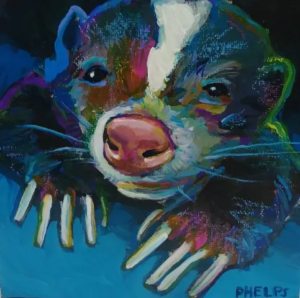 This week’s episode of All My Children Wear Fur Coats featured Kathryn Wysocki who shared insights into the fascinating world of pet skunks, highlighting their unique characteristics and offering expert tips on proper skunk care.
This week’s episode of All My Children Wear Fur Coats featured Kathryn Wysocki who shared insights into the fascinating world of pet skunks, highlighting their unique characteristics and offering expert tips on proper skunk care.
Kathryn Wysocki is the founder and president of Pet Skunk Advocates and Rescue (PSAR), a nonprofit organization dedicated to fostering and rehoming pet skunks and domesticated non-releasable wildlife. Although skunks are unconventional pets, Kathryn underscored several qualities that make them wonderful companions. Skunks are hypoallergenic, shed only once per year, and come in a wide range of coat colors. Additionally, Kathryn emphasized their affectionate and childlike personalities, which make them even more endearing as pets.
According to Kathryn, most skunks surrendered to PSAR are rehomed for the same reasons as dogs and cats—due to changes in their owners’ financial or living circumstances. Because skunks are classified as exotic pets, relocating them across state lines requires a special wildlife license. Even with this license, owning skunks is only legal in 13 states. With an average lifespan of 8 to 12 years, it’s crucial to commit to caring for a skunk throughout its entire life. Kathryn maintains a 0% recidivism rate by ensuring adopters are prepared for any contingencies that may arise.
Kathryn listed common health problems of pet skunks, including metabolic bone disease, diabetes, and obesity. She explained that the most common conditions can be circumvented with a well-balanced diet. Kathryn recommended a protein-rich meal plan supplemented with taurine and calcium to ensure optimal health.
One way Kathryn educates the community is through her “Reading Doesn’t Stink” program, an outreach initiative where PSAR visits schools, summer camps, and other educational settings. Each class receives a donated copy of Boomer to the Rescue, a children’s book about a lavender skunk who is nervous on his first day of school. Kathryn expressed her passion for changing public perceptions of skunks and opossums by engaging with the community and fostering greater understanding and appreciation for these often-misunderstood animals. In addition to her educational programs, Kathryn also brings her skunks as therapy animals to nursing homes, domestic abuse shelters, and other places in need of emotional support.
On the advocacy side of PSAR, Kathryn is pushing for legislative changes regarding skunk bites. Because skunks are classified as a rabies vector species, any bite from a wild or domestic skunk leads to mandatory euthanasia. However, Kathryn contends that skunks can only contract rabies through exposure to an infected animal. Given that domestic skunks are highly unlikely to carry the virus, she is advocating for a two-week quarantine period instead of automatic euthanasia.
If you would like to learn more about domestic skunks, or to place a donation, please visit Katspsar.com. Follow PSAR on social media at Instagram.com/PetSkunkAdvocatesAndRescue & Facebook.com/KatsPSAR.
Don’t forget to protect your cherished pet with a Pet Trust! See more info at ACT4Pets.org!
